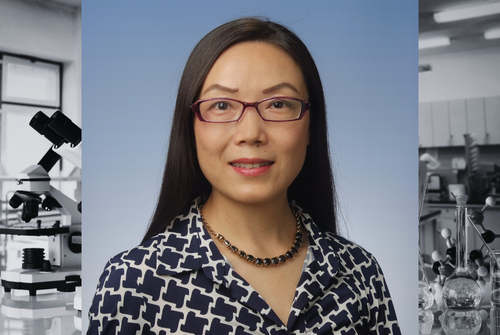Rose Wang, Ph.D., Assistant Research Professor at the UMKC School of Dentistry, has been awarded a National Institute of Health Developmental Research Grant (R21) for “Infrared Spectroscopic Imaging and Machine Learning for Risk Stratification of Oral Epithelial Dysplasia,” a research project focused on developing a quantitative and objective oral cancer early detection technique.
Oral epithelial dysplasia (OED) is a precancerous oral lesion associated with an increased risk of cancer development. Wang and her team have set out to develop a novel technique that will allow clinicians to make objective, accurate, evidence-based risk assessments for their OED patients, which in turn, will help facilitate early detection of oral cancer.
Wang is the principal investigator of the project and will direct the scientific development and execution alongside a collaboration of researchers in oral and craniofacial sciences, pathology, computing and engineering and biology from the UMKC School of Dentistry and the University of Kansas Medical Center.
The team’s novel technique is based on FTIR imaging and machine learning. FTIR imaging allows for precise and spatially resolved biochemical analysis of a sample, with each pixel containing a full FTIR spectrum and thousands of variables that can then be decoded using machine learning and deep learning to detect early signs of oral cancer.
Wang says this type of biomolecular fingerprinting is beneficial in that it avoids inter and intrapersonal biases of the traditional histopathological approach, does not require additional samples from the patient and is safer for the person working with the sample since this technique does not require chemical staining – just to name a few.
Wang has a clear passion for cancer research, which she has been a part of for over fifteen years in both industry and academia. She received her Ph.D. training in biophysics and bioengineering for cancer radioimmunotherapy from MIT and Harvard. She applied machine learning to FTIR spectroscopic data in a preliminary study and generated exciting results to support the current grant application.
Her passion for this research is something she hopes to pass along through teaching and mentoring. She also plans to apply for the American Cancer Society Research Scholar Grant and NIH R01 grant in 2023.
In addition to Dr. Rose Wang (PD/PI), the research team also includes Dr. Yong Wang (Ph.D., Co-PI), a Professor in the Department of Oral and Craniofacial Sciences at the UMKC School of Dentistry who has extensive experience in FTIR chemical imaging of dental issues and biomaterials, Dr. Tanya Marie Gibson (DDS, Co-I), an Associate Professor and a certified oral and maxillofacial pathologist in the Department of Oral Pathology at the UMKC School of Dentistry who has been actively involved in the clinical histopathological diagnosis of head and neck diseases, Dr. Yugyung Lee (Ph.D., Co-I), a professor of Computer Science at the UMKC School of Sciences and Engineering who is specialized in artificial intelligence, machine learning, deep learning, and medical informatics, Dr. Sufi M. Thomas (Ph.D., Co-I), an Associate Professor in the Department of Otolaryngology – Head and Neck Surgery with joint appointments in the Departments of Cancer Biology and Anatomy and Cell Biology at University of Kansas Medical Center who has extensive experience in tumor microenvironment and experimental therapeutics of head and neck cancers, and Dr. JoAnna Scott (Ph.D., Biostatistician), an Associate Professor in the Department of Oral and Craniofacial Sciences at the UMKC School of Dentistry who is specialized in biostatistics for clinical and translational research.


